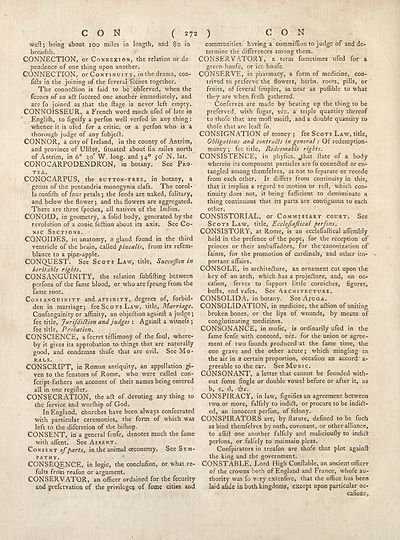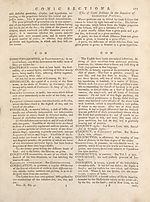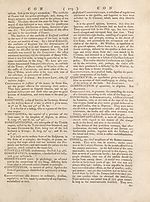Encyclopaedia Britannica; or, A dictionary of arts and sciences, compiled upon a new plan … > Volume 2, C-L
(300) Page 272
Download files
Complete book:
Individual page:
Thumbnail gallery: Grid view | List view

CON ( 27:
weft; being about 100 miles in length, and 80 in
breadth.
CONNECTION, or Connexion, the relation or de
pendence of one thing upon another.
CONNECTION, or Continuity, in the drama, con-
ftfts in the joining of the feveral ‘ftenes together.
The connection is faid to be obferved, when the
fcenes of an a£t fucceed one another immediately, and
are fo joined as that the ftage is never left empty.
CONNOISSEUR, a French word much ufed of late in
Englifti, to fignify a perfon well verfed in any thing:
whence it is ufed for a critic, or a perfon who is a
thorough judge of any fubjeCl.
CONNOR, a city of Ireland, in the county of Antrim,
and province of Ulfter, fituated about fix miles north
of Antrim, in 6° ?o/ W. long, and 540 jo' N. lat.
CONOCARPODENDRON, in botany. See Pro¬
tea.
CONOCARPUS, the button-tree, in botany, a
genus of the pentandria monogynia clafs. The corol¬
la confifts of four petals; the feeds are naked, folitary,
and below the flower; and the flowers are aggregated.
There are three fpecies, all natives of the Indies.
CONOID, in geometry, a folid body, generated by the
revolution of a conic feCtion about its axis. See Co¬
nic Sections.
CQNQIDES, in anatomy, a gland found in the third
ventricle of the brain, called pinealis, from its refem-
blance to a pine-apple.
CONQUEST. See Scots Law, title, SucceJJion in
heritable rights.
CONSANGUINITY, the relation fubfifting between
perfons of the fame blood, or who are fprung from the
fame root.
Consanguinity and affinity, degrees of, forbid¬
den in marriage; fee Scots Law, title, Marriage.
Confanguinity or affinity, an ohje&ion againft a judge;
fee title, Jurifdittion and judges : Againft: a witnefs ;
fee title, Probation.
CONSCIENCE, a fecret teftimony of the foul, where¬
by it gives its approbation to things that are naturally
good, and condemns thofe that are evil. See Mo¬
rals.
CONSCRIPT, in Roman antiquity, an appellation gi¬
ven to the fenators of Rome, who were called con-
fcript-fathers on account of their names being entered
all in one regifter.
CONSECRATION, the a<£l of devoting any thing to
the fervice and worfhip of God.
In England, churches have been always confecrated
with particular ceremonies, the form of which was
left to the difcretion of the bifttop.
CONSENT, in a general fenfe, denotes much the fame
with aflent. See Assent.
Consent of parts, in the animal oeconomy. See Sym¬
pathy.
CONSEQENCE, in logic, the conclufion, or what re-
fults from reafon or argument.
CONSERVATOR, an officer ordained for the fecurity
and prefervation of the privileges of feme cities and
: ) CON
communities, having a commiflion to judge of and de¬
termine the differences among them.
CONSERVATORY, a term fometimes ufed for a
green-houfe, or ice houfe.
CONSERVE, in pharmacy, a form of medicine, con¬
trived to preferve the flowers, herbs, roots, pills, or
fruits, of feveral fimples, as near as poflible to what
they are when frefh gathered.
Conferves are made by beating up the thing to be
preferved, with fugar, viz. a triple quantity thereof
to thofe that are moft moift, and a double quantity to
thofe that are leaft fo.
CONSIGNATION of money ; fee Scots Law, title,
Obligations and contrails in general: Of redemption-
money; fee title, Redeemable rights.
CONSISTENCE, in phyfics, jhat ftate of a body
wherein its component particles are fo conne&ed or en*-
tangled among themfelves, as not to feparate or recede
from each other. It differs from continuity in this,
that it implies a regard to motion or reft, which con¬
tinuity does not, it being fufficient to denominate a
thing continuous that its parts are contiguous to each
other.
CONSISTORIAL, or Commissary court. See
Scots Law, title, Eccleftajlical perfons.
CONSISTORY, at Rome, is an ecclefiaftical aflembly
held in the prefence of the pope, for the reception of
princes or their ambafladors, for the'canonization of
faints, for the promotion of cardinals, and other im¬
portant affairs.
CONSOLE, in architedlure, an ornament cut upon the
key of an arch, which has a projefture, and, on oc-
cafion, ferves to fupport little corniches, figures,
bulls, and vafes. See Architecture.
CONSOLIDA, in botany. See Ajuga.
CONSOLIDATION, in medicine, the adtion of uniting
broken bones, or the lips of wounds, by means of
conglutinating medicines.
CONSONANCE, in mufic, is ordinarily ufed in the
fame fenfe with concord, viz. for the union or agree¬
ment of two founds produced at the fame time, the
one grave and the other acute; which mingling in
the air in a certain proportion, dccafion an accord a-
greeable to the ear. See Music.
CONSONANT, a letter that cannot be founded with¬
out fome Angle or double vowel before or after it, as
b, c, d, 6 c.
CONSPIRACY, in law, fignifies an agreement between
two or more, falfely to indift, or procure to be indict¬
ed, an innocent perlbn, of felony.
CONSPIRATORS are, by ftatute, defined to be fuch
as bind themfelves by oath, covenant, or other alliance,
to aflirt one another falfely and malicioufly to indiCt
perfons, or falfely to maintain pleas.
Confpirators in treafon are thofe that plot againft
the king and the government.
CONSTABLE, Lord High Conftable, an ancient officer
of the crowns both of England and France, whofe au¬
thority was fo very exteqfive, that the office has been
laid alide in both kingdoms, except upon particular oc-
cafions.
weft; being about 100 miles in length, and 80 in
breadth.
CONNECTION, or Connexion, the relation or de
pendence of one thing upon another.
CONNECTION, or Continuity, in the drama, con-
ftfts in the joining of the feveral ‘ftenes together.
The connection is faid to be obferved, when the
fcenes of an a£t fucceed one another immediately, and
are fo joined as that the ftage is never left empty.
CONNOISSEUR, a French word much ufed of late in
Englifti, to fignify a perfon well verfed in any thing:
whence it is ufed for a critic, or a perfon who is a
thorough judge of any fubjeCl.
CONNOR, a city of Ireland, in the county of Antrim,
and province of Ulfter, fituated about fix miles north
of Antrim, in 6° ?o/ W. long, and 540 jo' N. lat.
CONOCARPODENDRON, in botany. See Pro¬
tea.
CONOCARPUS, the button-tree, in botany, a
genus of the pentandria monogynia clafs. The corol¬
la confifts of four petals; the feeds are naked, folitary,
and below the flower; and the flowers are aggregated.
There are three fpecies, all natives of the Indies.
CONOID, in geometry, a folid body, generated by the
revolution of a conic feCtion about its axis. See Co¬
nic Sections.
CQNQIDES, in anatomy, a gland found in the third
ventricle of the brain, called pinealis, from its refem-
blance to a pine-apple.
CONQUEST. See Scots Law, title, SucceJJion in
heritable rights.
CONSANGUINITY, the relation fubfifting between
perfons of the fame blood, or who are fprung from the
fame root.
Consanguinity and affinity, degrees of, forbid¬
den in marriage; fee Scots Law, title, Marriage.
Confanguinity or affinity, an ohje&ion againft a judge;
fee title, Jurifdittion and judges : Againft: a witnefs ;
fee title, Probation.
CONSCIENCE, a fecret teftimony of the foul, where¬
by it gives its approbation to things that are naturally
good, and condemns thofe that are evil. See Mo¬
rals.
CONSCRIPT, in Roman antiquity, an appellation gi¬
ven to the fenators of Rome, who were called con-
fcript-fathers on account of their names being entered
all in one regifter.
CONSECRATION, the a<£l of devoting any thing to
the fervice and worfhip of God.
In England, churches have been always confecrated
with particular ceremonies, the form of which was
left to the difcretion of the bifttop.
CONSENT, in a general fenfe, denotes much the fame
with aflent. See Assent.
Consent of parts, in the animal oeconomy. See Sym¬
pathy.
CONSEQENCE, in logic, the conclufion, or what re-
fults from reafon or argument.
CONSERVATOR, an officer ordained for the fecurity
and prefervation of the privileges of feme cities and
: ) CON
communities, having a commiflion to judge of and de¬
termine the differences among them.
CONSERVATORY, a term fometimes ufed for a
green-houfe, or ice houfe.
CONSERVE, in pharmacy, a form of medicine, con¬
trived to preferve the flowers, herbs, roots, pills, or
fruits, of feveral fimples, as near as poflible to what
they are when frefh gathered.
Conferves are made by beating up the thing to be
preferved, with fugar, viz. a triple quantity thereof
to thofe that are moft moift, and a double quantity to
thofe that are leaft fo.
CONSIGNATION of money ; fee Scots Law, title,
Obligations and contrails in general: Of redemption-
money; fee title, Redeemable rights.
CONSISTENCE, in phyfics, jhat ftate of a body
wherein its component particles are fo conne&ed or en*-
tangled among themfelves, as not to feparate or recede
from each other. It differs from continuity in this,
that it implies a regard to motion or reft, which con¬
tinuity does not, it being fufficient to denominate a
thing continuous that its parts are contiguous to each
other.
CONSISTORIAL, or Commissary court. See
Scots Law, title, Eccleftajlical perfons.
CONSISTORY, at Rome, is an ecclefiaftical aflembly
held in the prefence of the pope, for the reception of
princes or their ambafladors, for the'canonization of
faints, for the promotion of cardinals, and other im¬
portant affairs.
CONSOLE, in architedlure, an ornament cut upon the
key of an arch, which has a projefture, and, on oc-
cafion, ferves to fupport little corniches, figures,
bulls, and vafes. See Architecture.
CONSOLIDA, in botany. See Ajuga.
CONSOLIDATION, in medicine, the adtion of uniting
broken bones, or the lips of wounds, by means of
conglutinating medicines.
CONSONANCE, in mufic, is ordinarily ufed in the
fame fenfe with concord, viz. for the union or agree¬
ment of two founds produced at the fame time, the
one grave and the other acute; which mingling in
the air in a certain proportion, dccafion an accord a-
greeable to the ear. See Music.
CONSONANT, a letter that cannot be founded with¬
out fome Angle or double vowel before or after it, as
b, c, d, 6 c.
CONSPIRACY, in law, fignifies an agreement between
two or more, falfely to indift, or procure to be indict¬
ed, an innocent perlbn, of felony.
CONSPIRATORS are, by ftatute, defined to be fuch
as bind themfelves by oath, covenant, or other alliance,
to aflirt one another falfely and malicioufly to indiCt
perfons, or falfely to maintain pleas.
Confpirators in treafon are thofe that plot againft
the king and the government.
CONSTABLE, Lord High Conftable, an ancient officer
of the crowns both of England and France, whofe au¬
thority was fo very exteqfive, that the office has been
laid alide in both kingdoms, except upon particular oc-
cafions.
Set display mode to:
![]() Universal Viewer |
Universal Viewer | ![]() Mirador |
Large image | Transcription
Mirador |
Large image | Transcription
Images and transcriptions on this page, including medium image downloads, may be used under the Creative Commons Attribution 4.0 International Licence unless otherwise stated. ![]()
| Encyclopaedia Britannica > Encyclopaedia Britannica; or, A dictionary of arts and sciences, compiled upon a new plan … > Volume 2, C-L > (300) Page 272 |
|---|
| Permanent URL | https://digital.nls.uk/144917224 |
|---|
| Attribution and copyright: |
|
|---|
| Description | Ten editions of 'Encyclopaedia Britannica', issued from 1768-1903, in 231 volumes. Originally issued in 100 weekly parts (3 volumes) between 1768 and 1771 by publishers: Colin Macfarquhar and Andrew Bell (Edinburgh); editor: William Smellie: engraver: Andrew Bell. Expanded editions in the 19th century featured more volumes and contributions from leading experts in their fields. Managed and published in Edinburgh up to the 9th edition (25 volumes, from 1875-1889); the 10th edition (1902-1903) re-issued the 9th edition, with 11 supplementary volumes. |
|---|---|
| Additional NLS resources: |
|

